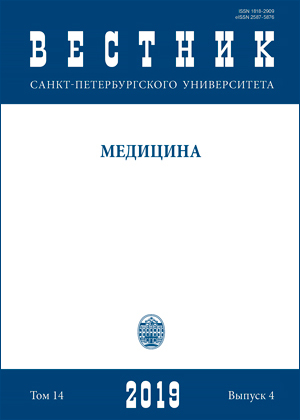Titer of antiphospholipid autoantibodies. Is it connected with clinical manifestation?
DOI:
https://doi.org/10.21638/spbu11.2019.428Abstract
Antiphospholipid syndrome is a systemic autoimmune disease characterized by persistent antiphospholipid autoantibodies, the development of thrombophilic conditions and recurrent pregnancy loss. In this study the incidence of antiphospholipid antibodies of different titers among the women with one or more episodes of fetal loss in the anamnesis was determined.According the data obtained, autoantibodies in medium and high titers for cardiolipin and beta-2-glycoprotein-1 were more common among the women with two or more episodes of recurrent pregnancy loss compared with the women who have only one episode of pregnancy
loss. In a group of women with one episode of pregnancy loss, antibodies in high titers were not detected. Based on this, it can be assumed that autoantibodies in medium and high titers have the most significant pathogenetic effect on the outcome of pregnancy. In contrast, autoantibodies in low titers are considered to be dubious and clinically insignificant.
Keywords:
antiphospholipid syndrome, antiphospholipid autoantibodies, recurrent pregnancy loss, miscarriage
Downloads
References
References
Downloads
Published
How to Cite
Issue
Section
License
Articles of "Vestnik of Saint Petersburg University. Medicine" are open access distributed under the terms of the License Agreement with Saint Petersburg State University, which permits to the authors unrestricted distribution and self-archiving free of charge.




